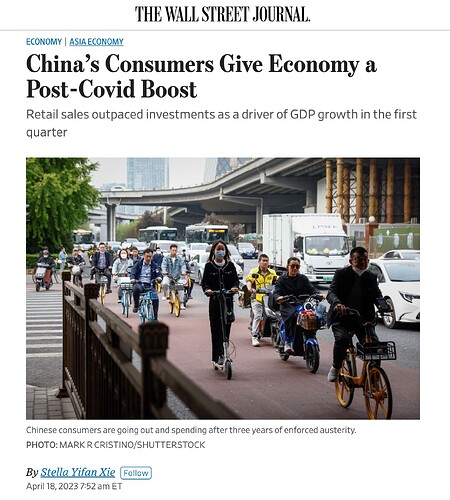-
中国在2021年第一季度报告了强劲的经济增长,消费者支出在推动经济复苏方面发挥了比预期更大的作用。对于面临通胀和金融业不稳定等不利因素的全球经济来说,这是一个亮点。3月份的零售额跃升了10%,是两年来最快的速度,并且超过了工业生产和固定资产投资的增长。
-
在大流行病发生之前,中国的经济增长严重依赖投资,而这些投资越来越多地流向财政上不太健全的项目。中国政府在鼓励消费者消费方面做了半心半意的尝试,但由于中国的社会安全网不发达,消费者消费受到阻碍。大流行病进一步加剧了这种不平衡,因为Covid协议阻碍了消费,而中国政府不愿意发放刺激性支票。
-
周二的数据表明,中国消费者现在在经济中发挥着更大的作用,经济学家预测,这一趋势将在未来几个月内继续下去。如果这种情况持续下去,它可能有助于解决中国的长期经济失衡问题,并为全球经济带来更多稳定。
-
在北京严格的Covid规则被突然取消后,中国消费者显示出他们渴望打开他们的钱包和消费。这导致了消费支出的大幅反弹,预计今年的GDP增长将超过6%。3月份,餐饮业收入猛增26%,而固定资产投资放缓,房地产投资下降。
-
经济学家们现在质疑,消费支出的跳跃只是短暂的,还是会导致更持久的转变。中国央行的一项调查显示,家庭正在将他们的心态转移到提取储蓄上。德国商业银行认为,如果信心继续增强,消费复苏可能会持续一段时间。
-
经济学家们预计,未来几个月强劲的总体增长数字将继续下去,然而,仍然有持续的阻力。出口增长可能是短暂的,劳动力市场的压力持续存在,私营企业家的信心仍然疲软。私营企业的投资在第一季度仅增长了0.6%。
-
China reported strong economic growth in the first quarter of 2021, with consumer spending playing a larger-than-expected role in driving the recovery. This is a bright spot for a global economy facing headwinds, including inflation and instability in the financial sector. Retail sales in March jumped 10%, the fastest rate in two years, and outpaced the increase in industrial production and fixed-asset investments.
-
Before the pandemic, China’s economic growth was heavily reliant on investments, which were increasingly going to less fiscally sound projects. Beijing had made halfhearted attempts to encourage consumer spending, which was held back by the country’s underdeveloped social safety net. The pandemic further exacerbated this imbalance, as Covid protocols discouraged spending and Beijing was reluctant to issue stimulus checks.
-
Tuesday’s data suggests that Chinese consumers are now playing a larger role in the economy, and economists predict that this trend will continue in the coming months. If this is sustained, it could help to address the long-term economic imbalances in China and bring more stability to the global economy.
-
After Beijing’s strict Covid rules were abruptly scrapped, Chinese consumers have shown their eagerness to open their wallets and spend. This has resulted in a sharp rebound in consumer spending and an expected GDP growth of surpassing 6% this year. Restaurant revenue surged by 26% in March, while fixed-asset investment moderated and property investment dropped.
-
Economists are now questioning whether the jump in consumer spending is merely ephemeral or will result in a more lasting shift. A survey by China’s central bank indicated that households were shifting their mindsets towards drawing down their savings. Commerzbank believes the consumer recovery could run for some time if confidence continues to brighten.
-
Economists expect strong headline growth figures to continue in the coming months, however, there are still persistent headwinds. Export growth may be short-lived, there is continuing labor market stress, and confidence among private entrepreneurs remains weak. Investments by privately-owned businesses only expanded by 0.6% in the first quarter.
